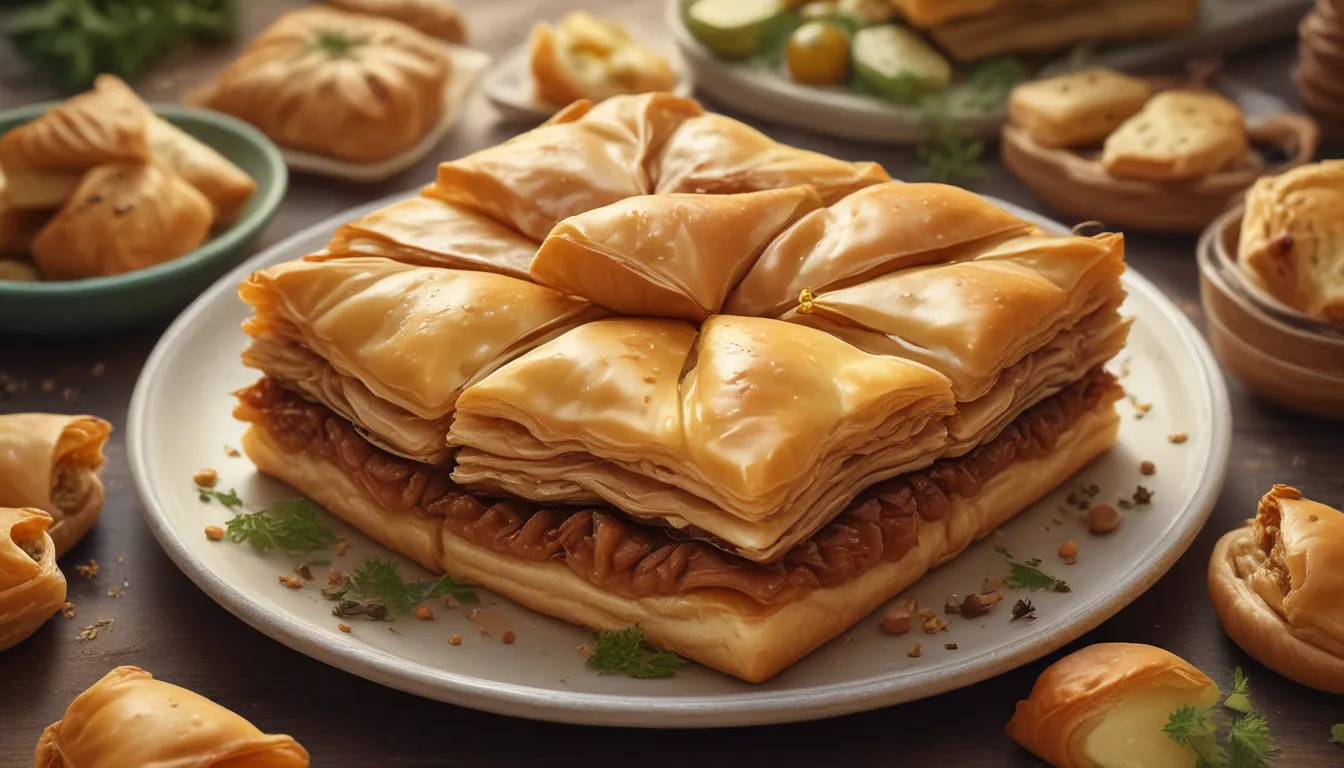The pictures in our articles might not always show exactly what the text is talking about. We use these images to make the article more interesting and eye-catching. They are there to add to the text, but not to replace it or show every detail.
Are you a fan of the delectable and famous pastry known as baklava? Originating in the Middle East, this sweet treat has captured the hearts and taste buds of people worldwide. But have you ever wondered about the nutritional value hidden within those layers of flaky goodness? In this article, we will explore 11 baklava nutrition facts to give you a better understanding of what makes this dessert so unique. From its calorie content to its vitamins and minerals, get ready to discover the delightful world of baklava!
Key Takeaways:
- Enjoy baklava in moderation as part of a balanced diet to reap its nutritional benefits.
- Explore different variations of baklava to find the one that suits your preferences and dietary needs.
Baklava: A Sweet Symphony of Flavors
Baklava is a rich and sweet pastry that combines layers of filo dough with a luscious mixture of nuts and sweet syrup. This unique blend of textures and flavors has made baklava a beloved dessert in many cultures around the globe. Whether you savor the crunch of the filo pastry or the sweetness of the syrup, baklava delights all the senses.
The Caloric Content of Baklava
Due to its ingredients such as sugar, nuts, and butter, baklava is a calorie-dense dessert. A typical serving of baklava can contain around 300-400 calories, depending on the size and specific ingredients used. It's essential to enjoy this delicious pastry in moderation to balance your calorie intake.
Healthy Fats in Baklava
One of the key components of baklava is the nuts used in its filling, such as almonds, walnuts, or pistachios. These nuts are a great source of healthy fats, which are beneficial for heart health when consumed in moderation. So, while indulging in baklava, you're also giving your body a boost of nutritious fats!
Protein Power in Baklava
In addition to healthy fats, baklava also provides a decent amount of protein. Nuts are a valuable plant-based source of protein, essential for tissue repair and growth in our bodies. With each bite of baklava, you're not just indulging in sweetness but also giving your body a protein-packed treat.
The Carbohydrate Richness of Baklava
Thanks to its layers of filo pastry and sweet syrup, baklava is rich in carbohydrates. Carbohydrates are our body's primary source of energy, providing the fuel we need for our daily activities. So, indulge in a slice of baklava for a delightful energy boost!
Nourishing Vitamins and Minerals in Baklava
The combination of nuts and honey in baklava offers a range of essential vitamins and minerals. Nuts are rich in vitamins E and B, as well as minerals like magnesium, copper, and zinc. These nutrients play a crucial role in supporting our overall health and well-being.
The Low Sodium Advantage of Baklava
If you're conscious of your sodium intake, baklava can be a suitable dessert choice. Traditionally made without excessive salt, baklava is a relatively low-sodium option compared to other packaged snacks or desserts. Enjoy a serving of baklava without worrying about sodium overload!
Sugar Sweetness and Antioxidant Power
While baklava is undeniably sweet and delicious, it also contains a significant amount of sugar due to the sweet syrup used in its preparation. It's important to enjoy baklava in moderation, especially for individuals with diabetes or those watching their sugar intake. On the bright side, baklava is also a rich source of antioxidants, thanks to the nuts it contains. Antioxidants help protect our cells from damage caused by harmful free radicals, making baklava not only tasty but also nutritious.
The Gluten Factor: Baklava and Gluten
Traditional baklava is made with filo pastry, which contains gluten. If you follow a gluten-free diet, you may need to explore alternative versions of baklava made with gluten-free pastry or ingredients. Don't let a gluten intolerance stop you from enjoying a slice of this delightful dessert!
A Worldwide Treat: Baklava Across Cultures
While baklava has its roots in Middle Eastern cuisine, it has found its way into the hearts and stomachs of people around the world. Variations of baklava can be found in countries like Greece, Turkey, Armenia, and Iran, each offering a unique twist on this beloved dessert. Whether you prefer the traditional version or a regional variation, baklava is a treat that transcends borders and cultures.
Conclusion: Indulge in Moderation for Delicious Nutrition
In conclusion, baklava is not just a sweet and indulgent dessert but also a source of valuable nutrients. With its vitamins, minerals, antioxidants, and healthy fats, baklava offers a delicious way to nourish your body. Remember to enjoy this pastry in moderation due to its calorie and sugar content, balancing it with other nutritious foods in your diet. So, go ahead and treat yourself to a piece of baklava, knowing that you're satisfying your cravings while giving your body some nutritional goodness.
FAQs About Baklava Nutrition
-
What is the calorie content of baklava?
Baklava typically contains around 300 to 400 calories per piece, depending on its size and ingredients. -
Is baklava high in sugar?
Yes, baklava is high in sugar due to the sweet syrups or honey used in its preparation. Enjoy it in moderation to maintain a healthy balance. -
Does baklava contain nuts?
Traditional baklava is filled with nuts like walnuts, pistachios, or almonds. Some variations may use different types of nuts. -
Can baklava be part of a healthy diet?
While baklava is a calorie-rich dessert, it can still be enjoyed as part of a healthy diet when consumed in moderation and balanced with nutritious foods. -
Are there health benefits to eating baklava?
Yes, baklava contains nuts that are rich in healthy fats, vitamins, and minerals. Additionally, the filo pastry used in baklava is lower in calories compared to other types of pastry.
Was this Page Helpful?
Our mission is to provide you with accurate, engaging, and trustworthy content that enriches your knowledge and curiosity. Each fact shared on our site is contributed by real users like you, ensuring a diverse and insightful collection of information. Our dedicated editors meticulously review each submission to maintain the highest standards of accuracy and authenticity. Trust in our commitment to quality as you explore and learn with us, discovering a world of fascinating facts and knowledge.






